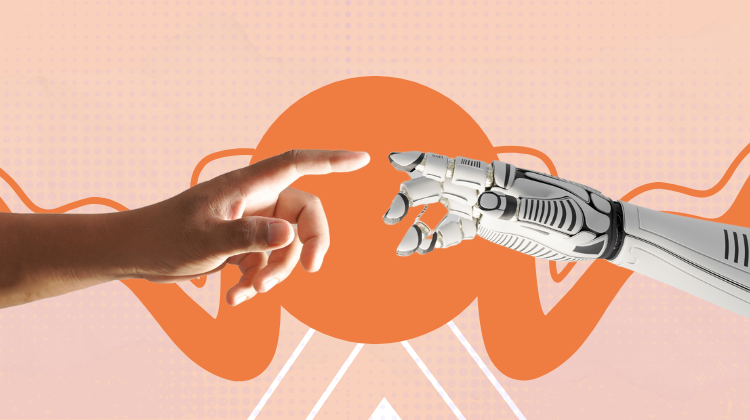Small bank, big moves: How a Maine-based bank is bringing over a thousand employees on its AI journey
- Bangor Savings Bank is building employee skills in AI and data fluency, creating a workforce ready for the AI era and countering fears of job displacement.
- The bank is using social learning, and role-based training to upskill its employees, as well as build a better foundation for its future initiatives.

The recent paradigm shift brought about by Gen AI has reopened many debates about de-skilling and job insecurity. Surveys that report 54% of roles in banking are at risk of job displacement don’t help either.
The best of both worlds
Banks should act and adopt new forms of AI like Gen AI, but it shouldn’t come at the cost of the livelihoods of millions of people or at the risk of building prejudiced systems. It seems like an impossible ask.
For some hardcore proponents of AI, the only way to avoid job loss is to upskill, and people ought to have started yesterday. Which shifts the responsibility from the employer to the employee, the very party most at risk.
This double bind can be avoided, though. Banks’ strategies should facilitate their employees’ adaptation to a Gen AI future.
How to build an employee-friendly AI-strategy
With $7 billion in assets, Maine-based Bangor Savings Bank is already readying itself for the AI-fueled future by focusing on its employees.
Here is how:
Through its recent partnership with Northeastern University’s Roux Institute, Bangor has announced a two-year program called “Accelerating Insights” which will focus on building data fluency and skills in ethical AI usage among its 1100 employees through customized learning modules built by The Roux Institute, a research center affiliated with the university. .
Assess where your employees are today: The Accelerating Insights program kicked off with an assessment of the bank conducted by The Roux Institute to gauge where the bank’s employees stood in their understanding of AI at the moment.
The assessment was done through a framework developed by The Roux Institute called LEAP, where the organization analyzed materials provided by the Bangor Savings Bank, like job descriptions, promotion and evaluation criteria, and what level of access different teams have to data systems. This was combined with insight drawn from employees of varying levels of seniority, said Liz Kohler, Managing Director of Strategy, Operations and Growth at The Roux Institute at Northeastern University.
The assessment allows the Accelerating Insights initiative to take a more role-based approach, with some roles receiving more technical training than others, according to Bangor’s Director of Strategic Initiatives, Sandra Klausmeyer.

Make learning relevant and social: The learning modules are live and delivered virtually, with employees gathering around a screen and then working through the lesson with their colleagues. “We think the best way to learn is to make it a social practice. How do we take our curriculum and then use the bank’s real world data and problems within the four walls of their company to help move the data fluency forward?” said Kohler.
Allay job loss fears: A major component of the communication around the Accelerating Insights program has been reassuring employees that their jobs are safe and this the bank’s way of investing in their future as well as its own.
“We have assured all employees that there should be no job insecurity. Our goal is finding efficiencies for our employees and getting information to them to better serve customers. No one is losing their job,” Klausmeyer added.
Focus on Responsible AI: Apart from job loss, another major concern emerging from deeper integration of AI systems in financial services is the potential of introducing biases and AI inflicting harm. Ensuring that employees across the board understand how these systems work is a major step towards increasing awareness. But the bank is also partnering with The Roux Institute’s Responsible AI team to ensure that employees understand how to use AI ethically, according to Jeff Turgeon, Senior Data Engineer at Bangor Savings Bank.

How to measure success
Bangor Savings Bank and The Roux Institute are measuring their program’s success in multiple ways:
- Replicability and independence: Currently, Turgeon is collaborating with The Roux Institute’s technical resources to go through all the phases of the program and “learn the entire process with them, so we are better prepared to be able to do projects like this on our own in the future,” he said. For Turgeon, the upskilling of the entirety of the bank’s workforce also means that future projects can use this improved baseline and aim higher.
- Measuring understanding and performance: To ensure the program is achieving the strategic objectives of the bank, The Roux Institute is measuring learner satisfaction and the number of skills gained by employees, as well as gathering qualitative feedback from team leaders. “That relationship between the manager and the employee is the key for the learning actually being cemented and taking hold. We are working with our colleagues at the bank to understand what’s really happening in the flow of work,” said Kohler.

The strategic investment Bangor Savings Bank has made in this initiative is indicative of how aware it is of the tides of change. But more importantly, for the rest of the industry, it’s a wake up call. Using Gen AI doesn’t have to be a harbinger for job cuts – instead, it can be the cause for banks to adapt to a new role in the community as a place for learning skills that improve its people’s employability.
Sidebar: Gen AI four ways
Sidebar is a member-exclusive section where we discuss stories tangential to the main story above. This week’s sidebar is about the recent applications we have seen of Gen AI from the biggest players in the industry.
To keep reading, please become a TS Pro member by clicking below. 


